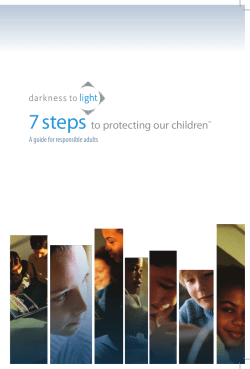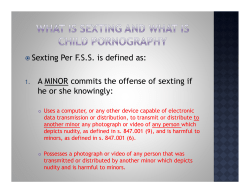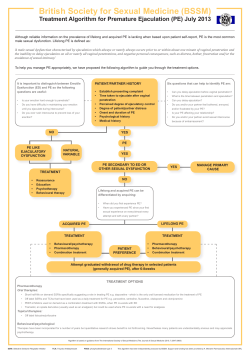
Sexual Violence on Campus: Why is this our Issue?
Sexual Violence on Campus: Why is this our Issue? ROBERT DONLEY SAUNDRA K . SCHUSTER EXECUTIVE DIRECTOR PARTNER BOARD OF REGENTS, STATE OF I OWA THE NCHERM GROUP, LLC Iowa Board of Regents: Lessons Learned Iowa Board of Regents Governance Structure – 9 member volunteer Board The Board is politically and gender balanced, and contains one student Regent Governs the School for the Deaf and the School for the Blind and the three state universities – University of Iowa, Iowa State University, and University of Northern Iowa Engages in policy-making, oversight and coordination of the five institutions under its jurisdiction Specifically tasked with the authority to develop written policies addressing sexual misconduct and abuse on Regent campuses. See Iowa Code section 262.9.28 (2013). 2 Fall 2007 Incident During the Fall 2007 a female student reported that she had been sexually assaulted by two student athletes. The matter was addressed under then-current University policies and procedures. These procedures provided – Two separate policies potentially covered allegations of sexual assault Allegations of sexual assault could be pursued informally. Individual Departments, including Athletics, were permitted to process informal complaints. A reporting structure that required that a number of offices be notified and involved in the investigation and resolution of formal allegations of sexual assault involving students 3 Lessons Learned and Action Taken Feedback Concerning 2007 Policies and Procedures – Multiple applicable policies creates confusion Involvement of multiple offices in investigation and resolution is cumbersome and confusing “Informal” resolution of allegations of sexual assault is inappropriate The process, from reporting to investigation and resolution, needed simplification and clarity Access to information on policies, reporting options, and victim services needed improving Make readily available and accessible a trained victim advocate Why was this feedback important to the University and the Board’s mission? 4 Lessons Learned and Action Taken Flagship Grant and Schuster & Clifford, L.L.P. – Conducted a comprehensive, system-wide evaluation of policies and procedures Engaged students, faculty, staff and administrators in the process Reviewed relevant State and Federal laws and best practices Outcomes – Implemented a single policy addressing Student Sexual Misconduct Created a single office tasked with receiving and investigating reports Created user-friendly web sites containing comprehensive resource and policy information Engaged in on-going training for all students, faculty and staff Commitment to continued engagement of students and staff in prevention, awareness, and procedures 5 The Headlines Addressing Sexual Assault on Campus Recent Chronicle Headlines ◦ Senator’s Survey Finds Subpar Response From Colleges to Sexual Assault ◦ Why Are Colleges in the Business of Handling Rape Cases? ◦ In Sex-Harassment Cases, No One Is Happy With Colleges’ Response ◦ Education Dept. Names 67 Institutions Facing Sex-Assault ◦ White House Raises the Bar for Colleges’ Handling of Sexual Assault ◦ 7 Senators Call for Steps to Improve Colleges’ Handling of Sexual Assaults NY Times ◦ Reporting Rape, and Wishing She Hadn’t: How One College Handled a Sexual Assault Complaint Inside Higher Ed ◦ Should expulsion be the default discipline policy for students accused of sexual assault? ◦ At college sexual assault summit, talk of apologies and 'toxic' climates © 2014 ATIXA ALL RIGHTS RESERVED 6 A Brief History “Dean Wormer” (1950’s) Dixon v. Alabama 1961 (Impact of Due Process) Civil Rights Era (VII, VI, IX), 1960’s & 70’s 1992 “Campus Sexual Assault Victims’ Bill of Rights” (the pendulum shifts) Gamechanger cases: ◦ Franklin v. Gwinnett 1992 ◦ Gebser v. Lago Vista 1998 ◦ Davis v. Monroe County 1999 Laws & Guidance ◦ 2001 OCR Guidance ◦ 2011 Department of Education “Dear Colleague Letter” (reinforcement of equity concept) ◦ VAWA/SaVE Act (March 7, 2013) ◦ White House Task Force Report, April, 2014 ◦ OCR – FAQ, April, 2014 © 2014 ATIXA ALL RIGHTS RESERVED 7 Framework for Addressing Sex & Gender Misconduct on Campus College Policy ◦ Reflect the law as well as campus mission and values Title IX – Applies to entire campus, covers sex/gender ◦ OCR creates Guidelines & provides oversight ◦ DOJ/DOE Compliance Requirements Title VII – Limited to employment only (covers sex, race, religion and national origin) Case law Clery Act ◦ “Campus Sexual Assault Victims’ Bill of Rights” “SaVE Act” 2013 Violence Against Women (VAWA ) Act & SaVE Act (March, 2013) President’s Task Force on Sexual Assault Report (April, 2014) OCR – FAQ (April, 2014) © 2014 ATIXA ALL RIGHTS RESERVED 8 Title IX “No person in the United States shall, on the basis of sex, be excluded from participation in, be denied the benefits of, or be subjected to discrimination under any educational program or activity receiving federal financial assistance.” Title IX of the Education Amendments of 1972 Implementing Regulations at: 20 U.S.C. § 1681 & 34 C.F.R. Part 106 © 2014 ATIXA ALL RIGHTS RESERVED 9 A Bit More About Title IX Federal Law enacted in 1972 Intended to end sex discrimination in all areas of education, including in employment Made non-discrimination based on sex/gender a condition of participation in all federally funded education programs for both public and private institutions It applies to educational program equity, such as in athletics, and also to sexual harassment and sexual misconduct and violence Compliance with the law is overseen by the U.S. Dept. of Education, Office of Civil Rights © 2014 ATIXA ALL RIGHTS RESERVED 10 11 Regulatory Oversight Of Title IX U.S. DEPT. OF EDUCATION OFFICE OF CIVIL RIGHTS (OCR) © 2014 ATIXA ALL RIGHTS RESERVED Role Of OCR & Title IX The Office for Civil Rights (OCR) is responsible for establishing the compliance standards to be applied in investigations and enforcement of Title IX OCR requires that once a school has notice of possible sexual harassment of a student, the school should take immediate and appropriate steps to: Investigate what occurred Take prompt and effective action to end the harassment Remedy the effects Prevent the recurrence © 2014 ATIXA ALL RIGHTS RESERVED 12 Regulatory Standards Include If the institution has “notice” of sexual misconduct, these four steps are the school’s responsibility whether or not the student who was harassed makes a complaint or otherwise asks a school to take action OCR acknowledges that there may be circumstances where the complainant requests confidentiality or refuses to participate, thus, the school’s ability to take action may be limited BUT - the school is still required to take all reasonable steps to investigate and respond © 2014 ATIXA ALL RIGHTS RESERVED 13 OCR Title IX Compliance Requirements Publication of Policies and Procedures that includes: ◦ Non-discrimination Statement ◦ Effective reporting and response protocol ◦ Appropriate grievance procedures ◦ Fair and equitable investigations ◦ Equitable remedies ◦ Prevention of recurrence ◦ Incorporation of training as specified by the VAWA/SaVE Act ◦ Appointment of a Title IX Coordinator © 2014 ATIXA ALL RIGHTS RESERVED 14 The IX Commandments Thorough Reliable Impartial Investigation Prompt Effective Equitable Process End the Discrimination Prevent its Recurrence Remedy the effects upon the victim & community Remedies © 2014 ATIXA ALL RIGHTS RESERVED 15 Civil Law Suits v. Administrative Action & Title IX © 2014 ATIXA ALL RIGHTS RESERVED LAW SUIT ADMINISTRATIVE ACTION Filed in Federal Court Initiated by OCR Monetary damages, injunction Voluntary compliance or findings Requires: ◦ Actual Notice ◦ Employee with authority to take action ◦ Deliberate Indifference Requires: ◦ Actual OR Constructive Notice (“knew or should have known” ◦ Investigate – End harassment – Remedy Impact – Prevent recurrence © 2014 ATIXA ALL RIGHTS RESERVED 17 OCR – Dear Colleague & FAQ’s PUBLISHED APRIL 1, 2014 © 2014 ATIXA ALL RIGHTS RESERVED Significant Messages of the FAQ’s The FAQ’s represent a “Significant Guidance Document under the Office of Management and Budget’s Final Bulletin for Agency Good Guidance Practices Supplements the DCL from April 4, 2011 & the 2001 Guidance Schools should take steps to provide appropriate remedies to victims of sexual misconduct (and, where appropriate, the broader population) even if the perpetrator is not a member of the school community Three essential procedural requirements to follow: ◦ Disseminate a notice of non-discrimination ◦ Designate at least one Title IX Coordinator ◦ Adopt & publish grievance procedures providing for prompt and equitable resolution of student and employee sex discrimination complaints © 2014 ATIXA ALL RIGHTS RESERVED 18 Significant Messages of the FAQ’s Substantial information regarding: Who are “Responsible Employees” and what are their obligations What constitutes “notice” requiring the school to take action Who are “confidential employees” – what must we tell the community Intersection of campus actions with criminal investigations and actions Guidance regarding campus investigations and hearings Reinforcement of broad campus outreach VAWA/SaVE Act did not alter the school’s obligations under Title IX or the DCL © 2014 ATIXA ALL RIGHTS RESERVED 19 20 VAWA & SaVE Act SIGNED INTO LAW MARCH 7, 2013 EFFECTIVE MARCH 7, 2014 FEDERAL REGISTER JUNE © 2014 ATIXA ALL RIGHTS RESERVED Recent Clery Changes: VAWA Reauthorization & Section 304-SaVE Act The SaVE Act (Section 304) significantly amends the Clery Act Adds numerous reporting requirements to the Annual Security Report (ASR) 2014 ASR must reflect new law Increased focus on bystander intervention Must identify trained, confidential victim advocates who can provide emergency and ongoing support (a “key” best practice) Addresses remedies and support for victims © 2014 ATIXA ALL RIGHTS RESERVED 21 Training Mandates The SaVE Act requires increased attention to training efforts, including substantial campus-wide and constituency-targeted training and prevention programming requirements [Note: substantial commitment & costs!] Extensive new training requirements focusing on sexual assault, stalking, domestic violence and dating violence, prohibits retaliation Mandatory training for all incoming students and employees Ongoing training for all faculty Annual training for all individuals involved with the grievance process (Title IX, hearing officers, appeals officers, investigators) © 2014 ATIXA ALL RIGHTS RESERVED 22 23 White House Task Force Report PUBLISHED APRIL 1, 2014 © 2014 ATIXA ALL RIGHTS RESERVED White House Task Force Report April, 2014 Recommends 4 Action Steps: 1. Identify the problem by conducting Campus Climate Surveys 2. Engage in Primary Prevention Programs and engage men 3. Develop effective response protocols ◦ Provide confidential reporting resources ◦ Create a comprehensive Sexual Misconduct Policy ◦ Provide trauma-informed training ◦ Provide effective disciplinary systems ◦ Partner with community resources © 2014 ATIXA ALL RIGHTS RESERVED 24 White House Task Force Report April, 2014 4. Increase Transparency and Improve Enforcement ◦ The White House web site NotAlone.gov will publish enforcement data ◦ OCR continues to highlight enforcement expectations, FAQ’s released to reinforce expectations ◦ OCR & DOJ entered into an agreement to better coordinate their work in the area of Title IX and Clery © 2014 ATIXA ALL RIGHTS RESERVED 25 White House Report: Rape and Sexual Assault: A Renewed Call to Action The Report summarizes the intention of OCR’s recent Resolution Agreements with institutions. Such Agreements strive to help campuses develop: ◦ Comprehensive plans for educating students and employees about sexual assault; ◦ Policies and practices for responding to allegations of sexual violence; ◦ Adequate training for school officials charged with responding to complaints; and ◦ Policies to ensure that survivors are given the remedies and resources they need to continue their educations. These are guideposts for us to consider on our own campuses Source: Rape and Sexual Assault: A Renewed Call to Action, Jan. 2014, p. 25 © 2014 ATIXA ALL RIGHTS RESERVED 26 AND More Legislation to come! July 30, 2014 A Bi-partisan group headed by Sen. McCaskill (Mo.) introduced the “Campus Accountability and Safety Act” which would require nationwide surveys of students; increase financial penalties for violating existing regs. (from $35,000 to $150,000); introduces new roles for campus advocates; mandate increased disclosure from Dept. of Ed. About investigations conducted under Title IX. July 30, 2014 Senator Boxer (Calif.) and Rep. Davis (Calif.) introduced the “Survivor Outreach and Support Campus Act” (“SOS Act”) which would require institutions to establish an independent, on-campus advocate to support victims of sexual assault July 31, 2014 Rep. Speier (Calif.) and Rep. Meehan (Pa.)introduced the “Hold Accountable and Lend Transparency on Campus Sexual Assault Act” (“HALT Act”) focused on requiring penalties for non-compliance of Title IX; create a private right of action for individuals harmed by institutions failure to meet requirements; increase penalties for Clery violations; mandate annual climate surveys…and more © 2014 ATIXA ALL RIGHTS RESERVED 27 What I Am Seeing On Campuses Increased attention to issues of sexual harassment, hostile environment, violence Confusion in sorting out issues when drugs or alcohol is involved-training needed! Increased reporting (Clery numbers are going up—that’s a GOOD thing!) More “helpers” for victims in filing complaints or civil suits Increased media attention Conflicts with free speech Issues of due process for accused v. victim’s rights Emphasis on applying an “investigator model” to civil rights allegations, movement away from standard hearing board approaches Schools examining current policies & procedures for compliance-status quo challenged © 2014 ATIXA ALL RIGHTS RESERVED 28 Tips For State Leaders Ensure all institutions have appointed a Title IX Officer ◦ Not Just a figurehead ◦ Must be trained in the scope of the laws and regulations related to sex & gender misconduct; knowledgeable about Title IX response requirements Require development of climate surveys Require a published non-discrimination notice in compliance with Title IX Encourage schools to audit their policies and procedures Encourage schools to develop a single Community-Based Policy on Sexual Misconduct and Harassment (incorporate “Essential Policy Elements”) Require schools to identify “Responsible Employees” and Confidential Reporting Sources © 2014 ATIXA ALL RIGHTS RESERVED 29 Thank You! Questions? Saundra K. Schuster, Esq. Saundra@NCHERM.org www.NCHERM.org www.ATIXA.org © 2014 ATIXA ALL RIGHTS RESERVED 30
© Copyright 2025














